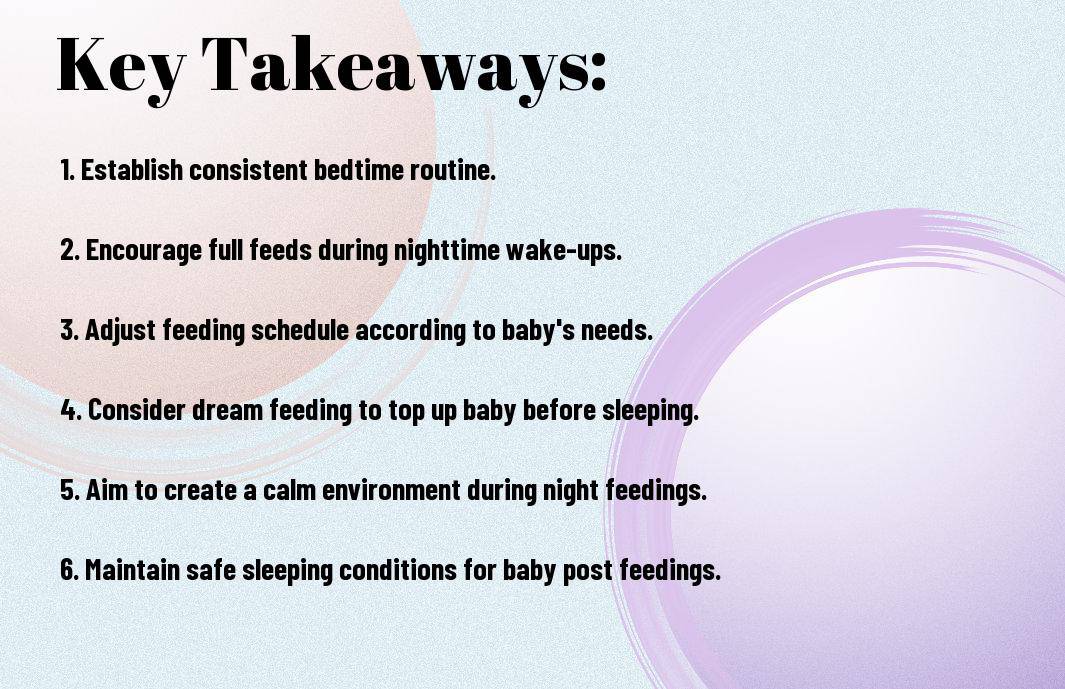tips, tricks and guides for parenthood
Managing night feedings can be a challenging task for many parents, as it often involves finding a balance between ensuring your baby is well-fed and getting enough sleep for both you and your little one. In this blog post, we will explore effective strategies and tips to help you navigate the world of night feeding management. From creating a feeding schedule to exploring different feeding techniques, we will provide you with the information you need to strike a healthy balance between night feedings and much-needed rest. By implementing these practical suggestions, you can better manage night feedings while promoting better sleep for both you and your baby.

Infants go through various sleep cycles that are crucial for their development. These cycles include light sleep, deep sleep, and REM (rapid eye movement) sleep. As babies mature, their sleep patterns evolve, with newborns initially having shorter sleep cycles of around 40-50 minutes. By the age of six months, most infants start to establish a more predictable sleep-wake cycle.
Adapting to your baby's natural rhythms is key to managing night feedings effectively. By paying close attention to your baby's cues and signals, such as rubbing eyes, yawning, or sucking on fists, you can begin to anticipate their sleep needs. Establishing a bedtime routine and a conducive sleep environment can also help signal to your baby that it's time to wind down and prepare for sleep.
As far as managing night feedings, it's necessary to find a balance that ensures your baby is well-fed while maximising your own rest. To learn more about night weaning and phasing out night feeds, check out Night weaning & phasing out night feeds.
Creating a consistent routine for night feedings can help your baby understand when it's time to eat and time to sleep. Start by feeding your baby in a quiet, dimly lit room to avoid stimulating them too much during the night.
To ensure efficient and calm night feedings, try to keep the environment as peaceful as possible. Use a comfortable feeding chair or bed, have all necessary items within reach, and burp your baby gently after feeding to prevent discomfort. Assuming your baby is well-fed and not hungry for other reasons will help reduce unnecessary wake-ups during the night.
Parenting a newborn often involves sleepless nights, leading to sleep deprivation. To cope with this, it is crucial to prioritise sleep whenever possible. Nap when your baby naps, and consider sharing night feedings with your partner to ensure both parents get some rest. Creating a calming bedtime routine and avoiding caffeine and electronic devices before bed can also help improve sleep quality.
It is crucial for parents to seek support and utilise available resources to manage the challenges of caring for a newborn. This may include reaching out to family and friends for help, joining parenting groups for advice and solidarity, or consulting healthcare professionals for guidance on infant care. Online resources and support forums can also provide valuable information and a sense of community for parents going through similar experiences.
Frequent waking during night feedings can be a common challenge for parents. To address this issue, it is important to establish a consistent bedtime routine, ensure your baby is well-fed before bedtime, and create a comfortable sleep environment. Additionally, consider implementing a dream feed to help bridge the gap between night feedings and promote longer stretches of sleep.
Transitioning to longer sleep periods can be a gradual process that requires patience and consistency. Start by gradually extending the time between night feedings, encouraging your baby to self-soothe, and establishing a soothing bedtime routine. It is important to remember that each baby is different, so be flexible and adjust your approach based on your baby's individual needs and cues.
Managing night feedings can be challenging but crucial for both the baby's nutritional needs and the parent's sleep. Finding the right balance between ensuring the baby gets enough nourishment during the night and allowing everyone to get adequate rest is important for the overall well-being of the family. Consistency, communication between parents, and taking shifts can help distribute the workload and ensure everyone gets some uninterrupted sleep. Recall, it's important to consult with a healthcare provider to ensure that your baby's feeding schedule meets their individual needs while also considering the importance of rest for the entire family.
A: Night feeding management involves balancing nighttime feedings with sleep to ensure both the baby and the caregiver get enough rest.
A: Normal night feedings can vary depending on the age and feeding habits of the baby, but newborns typically need to feed every 2-3 hours.
A: To establish a good night feeding routine, try to feed your baby at consistent times each night, keep the room dark and quiet, and avoid stimulating activities.
A: For newborns and young babies, it is usually necessary to wake them for night feedings to ensure they are getting enough nourishment for healthy growth and development.
A: Some tips for managing night feedings include taking turns with a partner, practising safe co-sleeping, and nap when the baby sleeps during the day to make up for lost sleep at night.